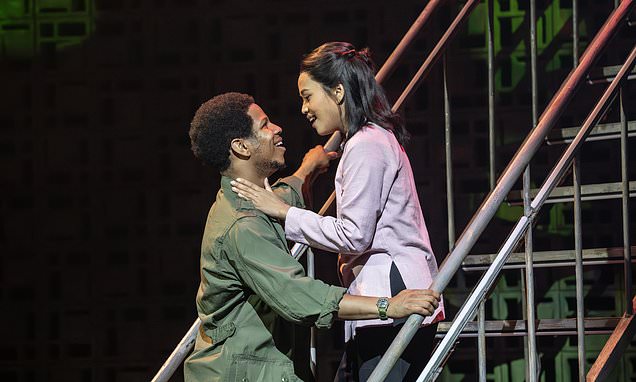Why the PC mob’s no match for Miss Saigon: PATRICK MARMION reviews Sheffield’s Crucible Theatre’s revival of former West End hit
Congratulations to Robert Hastie and his team at Sheffield’s Crucible Theatre for facing down idiotic accusations of racism in their stonking revival of Claude-Michel Schonberg and Alain Boublil’s musical, Miss Saigon.
The scheduling of the show had been marred by the censorious New Earth Theatre Company, who decided to pull one of their own productions at the venue, in protest at Sheffield’s revival of the former West End hit based on Madame Butterfly.
The central sneer is that the story of the chaotic American exit from Saigon at the end of the Vietnam War is filled with colonial stereotypes. Particularly offensive was the idea that a woman might sacrifice herself for the future of her child.
Yet far from being stereotypical, the characters are — unusually for a musical — fitted with powerful moral dilemmas. Not only the sacrifice of the heroine Kim, but also the life-destroying guilt of her lover Chris, a young drafted GI who desperately tries to do the right thing.

Congratulations to Robert Hastie and his team at Sheffield’s Crucible Theatre for facing down idiotic accusations of racism in their stonking revival of Claude-Michel Schonberg and Alain Boublil’s musical, Miss Saigon
Hardly a work of documentary realism, it’s driven by Schonberg’s tremendously stirring score: a sonic river fusing lush orchestration with American jazz and Vietnamese percussion. Richard Maltby Jr and Boublil’s songs, too, are rooted in combative duets and emotional High Noons.
Hastie and Anthony Lau’s production is also lit up by the delicate, yet richly resonant voice of Desmonda Cathabel (at the performance I saw). And far from being the simpering victim the PC mob take her for, her character is as proud and inscrutable as she is steely and wilful.
As for her beloved GI Chris, Christian Maynard is an earnest, full-voiced youth. And playing the maitre d’ at the Dreamland knocking shop (The Engineer, originally and controversially played by the white Jonathan Pryce), Joanna Ampil is a swaggering, hard-boiled businesswoman. But her faith in the American dream is bitterly abandoned in a grotesque, ticker-tape parade of dollar bills at the climax.
The show also boasts one of the designs of the year. Ben Stones conjures up the Vietnamese capital as an edifice of scale-model apartment blocks. This, and ever-changing floor patterns, are stunningly lit by Jessica Hung Han Yun to create shimmering, saturated colours that match the searing intensity of Schonberg’s troubled and disturbing score.
No wonder the Crucible has had to extend its run.
n IF IT’S politically correct Victorian stereotypes you’re after, the RSC has them in abundance. Their revival of Tanika Gupta’s The Empress is a Dickensian cornucopia of feel-good half-truths.
It’s a three-hour epic covering Queen Victoria’s final years, the plight of the era’s Indian nannies, and the story of Dadabhai Naoroji (Britain’s first Indian MP). We also have golden-hearted Cockney ‘sex workers’ and a squad of idealised and exploited Indian sailors.
Rather optimistically, we’re asked to swallow the idea that Victoria not only headed a brutal colonial regime, but was also fiercely opposed to racism and the horrors of war. And yet, Gupta pursues her historical fantasy with good humour and a sense of fun.
Alexandra Gilbreath has never sounded more like Maggie Thatcher as the impish and easily amused Queen Vic.

The Crucible theatre in Sheffield, Yorkshire
Just as important is the play’s other heroine Rani, the 16-year-old nanny who is dumped by her employers on arrival from India. Played with levity and fizz by Tanya Katyal (making her RSC debut), she is sexually abused by a predatory aristocrat, has her abandoned baby saved by the kindly sex workers, and is given a cosy home by caricatured Methodists — before being exalted as Naoroji’s Parliamentary Secretary.
The bovine conclusion is that Victorian misogynistic, racist hypocrisy is, as one character says: ‘all bull****’.
But, on the plus side, there is hardly a dull moment in this cheerful revisionist odyssey — and it’s directed with optimistic fervour by Pooja Ghai.
I tired of all the social proselytising, but in that, too, The Empress owes much to its Victorian roots.
Source: Read Full Article


